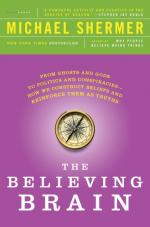|
This section contains 879 words (approx. 3 pages at 400 words per page) |

|
Patternicity
The brain receives information of all kinds. Some of the information is factual and some is not. But the brain must process all the information it receives. It doesn't judge it for veracity but what it does do is find meaningful patterns in both meaningful and meaningless information. This process is called "patternicity."
There are different types of patternicity. Anecdotal patternicity is a common form of the process but can lead to faulty conclusions. If a person heard anecdotal information that a herb could cure a disease, he may place himself at risk if he forms a belief about the herb and takes it expecting to cure his own condition. The anecdotal information failed to mention that the person who was cured was also taking prescribed medications which is what really cured him. But the brain could take in the anecdotal information, like what it learned, create a...
|
This section contains 879 words (approx. 3 pages at 400 words per page) |

|




